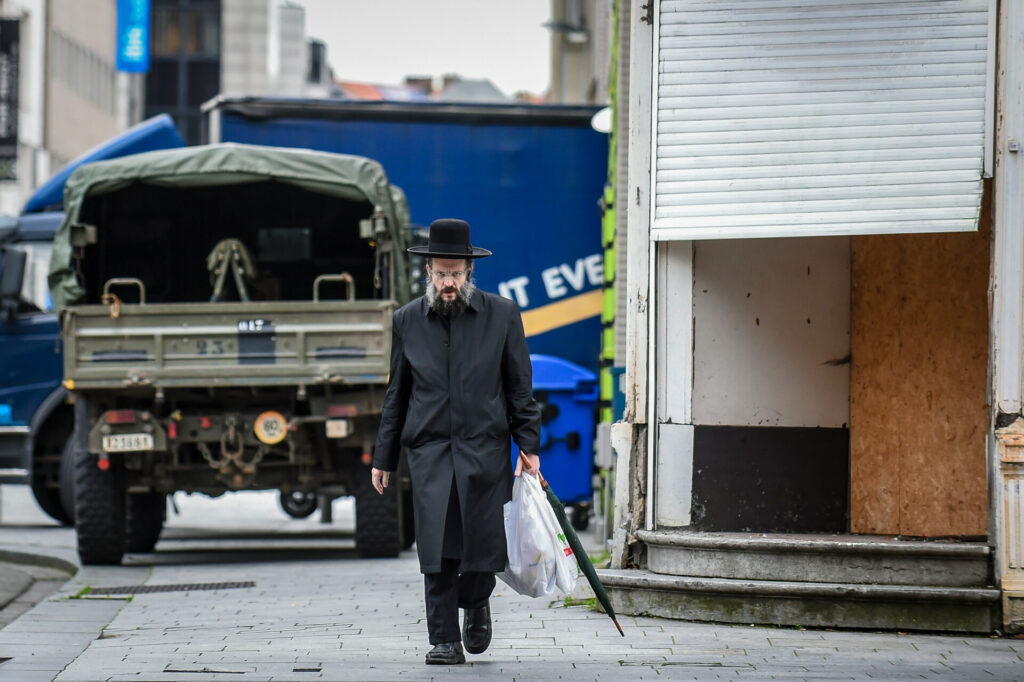Jews across Europe continue to face wide-spread anti-Semitism, including in Belgium, where violence and harassment have led to many hiding their identity and foregoing wearing religious symbols.
There are around 34,500 Jewish people living in Belgium, of whom many feel their quality of life is poor. The EU Fundamental Rights Agency's (FRA) recent survey of 688 Belgian Jews aged 16 or over confirmed that the situation has not improved.
"Europe is witnessing a wave of anti-Semitism, partly driven by the conflict in the Middle East," FRA Director Sirpa Rautio said. "This severely limits Jewish people's ability to live in safety and with dignity."
The survey dates back to before the Hamas attacks on 7 October 2023 and the subsequent criticised military offensive against the Gaza Strip, which spurred a rise in anti-Semitic incidents. To assess the impact that the conflict has had on anti-Semitism in Europe since, the report included information collected from 12 Jewish organisations earlier this year. They noted that Jewish people have experienced more anti-Semitic incidents since October 2023, with some reporting an increase of over 400%.
More likely to hide
Even before the conflict escalated, 97% of Jewish people in Belgium said they encountered anti-Semitism in their daily lives. The majority (84%) consider hostility against Jewish people a significant problem in their lives in Belgium, in line with the EU average. Around the same share believes that anti-Semitism has increased in Belgium in the last five years.
Around one in six respondents in Belgium are worried about harassment and half about being attacked – the highest rates seen among all 13 surveyed countries. Another outlier includes the 49% of Jews who have been harassed in the year before the survey because of their religious identity, significantly more than the European average of 37%. Almost one in ten have been physically attacked in the previous five years (compared to 5% EU-wide).
The survey also showed that Jewish people in Belgium are more often encountering online anti-Semitism (68% compared to the EU average of 61%). Anti-Semitic comments are most prolific on social media platform Facebook (26%), however, almost one in four said they encountered online anti-Semitism in the news. As a result, a quarter avoid posting content online which would identify them as Jews.
This hiding of religious identity also occurs in the public sphere. Seven in ten Jewish people in Belgium hide their identity in public because they do not feel safe; just over half (51%) never wear Jewish symbols. This sense of insecurity also impacts their interactions with others in the community: 40% say they avoid Jewish events due to feelings of insecurity, while 54% avoid certain locations. Nowhere in the surveyed countries is this figure higher than in Belgium.
Guaranteeing safety
Jewish people in Belgium also more often think that the Israel-Palestine conflict has an impact on their feeling of safety. The share of people who feel they are blamed at least occasionally for the Israeli government's actions because they are Jewish is also the highest rate in the survey.
Almost half of Belgian Jews have considered emigrating in the past five years for reasons related to being Jewish. The Federal Government has strengthened security measures to protect the Jewish community, especially in Antwerp's Jewish Quarter, but Belgian Jews do not have much faith in the authorities to combat anti-Semitism (10% compared to 18% EU-wide).
Rautio stressed that the EU should "build on existing laws and strategies to protect communities from all forms of hate and intolerance," both online and offline. "In an increasingly polarised society, we urgently need to spread the message of tolerance and ensure respect for the fundamental rights and freedoms of all."

